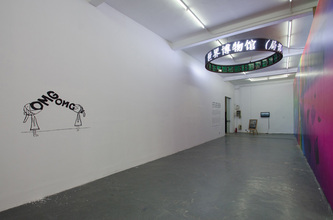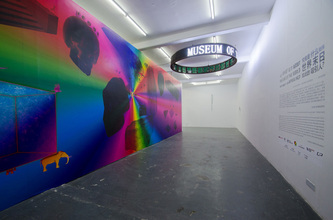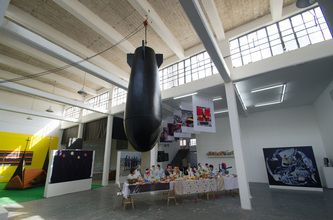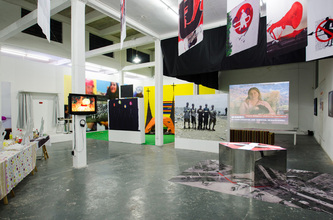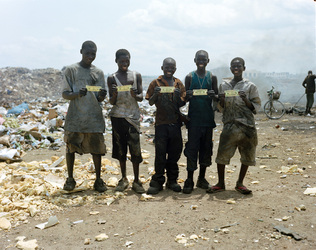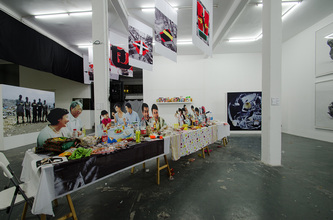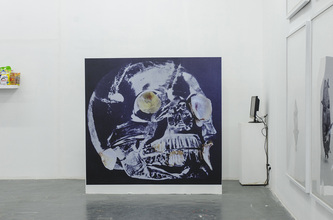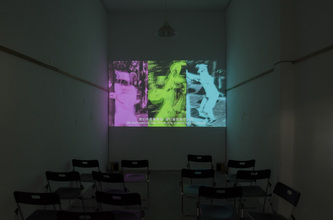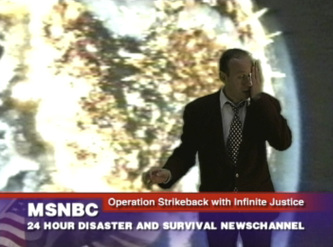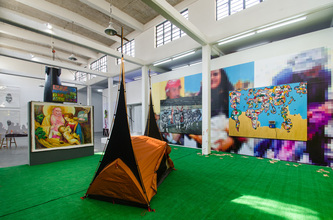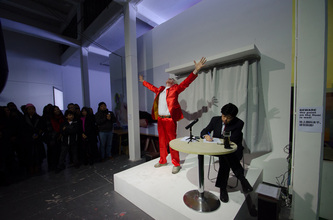Just what is it about the end of the world that makes it so appealing?
2012.11.24 - 2013.01.07
V-Art Center
M50, Bldg 3, 2F
"It's way easier to imagine the end of the world, than it to imagine the end of the current order." ... we got all these, you know, films about the end of the world, because the end of capitalism... you know, forget it, you can't even imagine it.
——Michael Hardt
Many predictions are that we are living at the end of days. The Mayan calendar, Kalki Bhagavan, The I Ching, Dresden codex and many others all point to the imminent and immediate apocalypse. But this impending doom also brings with it a demented sense of curiosity, elation, dismissal and relief from the conundrum of contemporary reality. I mean just what is it about the end of the world that makes it so appealing?
Furthermore the Apocalypse has been anticipated since the birth of humanity. In fact all religions have their own eschatological vision, as if a collective death wish is just part of being human. More recently Hollywood films, books, media spectacle and general public chatter have anticipated the end of days. Is it even worth considering anymore? Has it already happened and we aren't aware of it? Shall we celebrate it? Is it something that we will watch from the comfort of our living room couches via satellite TV, much like we watch the films that portray it or newscasts of man made catastrophes, or the world cup? For a global culture spinning further towards the secular with every hamburger sold and so-called fundamentalist war fought, does it really matter?
The title of the exhibition riffs off Richard Hamilton's seminal work Just what is it that makes today's homes so different, so appealing? which was ironically produced for the exhibition This is Tomorrow, an early cross-disciplinary exhibition that explored pop and consumer culture’s impact on the world. Today, in a global culture fully swayed by popular, media and consumer trends how do we confront the final spectacle? This exhibition presents some artistic responses to this query.
Participating Artists:
Gao Weigang (CN), Geng Yini (CN), Double Fly (CN), Hu Xiangcheng (CN), Li Jinghu (CN), Liu Jianhua (CN), Ma Daha (CN), MadeIn Company (CN), Ouyang Chun (CN), TOF (CN), Wang Jiaxue (CN), Yang Zhenzhong & Shi Qing (CN), Zhang Ding (CN), Zhang Lehua (CN), Zheng Wei (CN), Zhou Xiaohu (CN), Robert Bischoff (US), Jean Christian Bourcart (FR), Olaf Breuning (CH), Christoph Draeger (CH) & Reynold Reynolds (NL), Rainer Ganahl (AT), Chris Gill (UK), Kenneth Tin-Kin Hung (US), Marc Lafia (US), Gabriel Lester (NL), Dana Levy (IL) , Girolamo Marri (IT) & Chen Hangfeng (CN), Leela Schauble (AU), Heidi Voet (BE)
《究竟是什么使得世界末日如此吸引人?》
2012.11月24日至2013年1月7日
视界艺术中心
莫干山路50号,3号楼,2层
“相对于现行秩序的终结,想像世界的末日会来得更容易。”.…我们都看到了,你知道,那些关于世界末日的影片,就因为资本主义的结束…你知道的,就算了吧,你根本没法想像。
——麦克·哈尔特
许多预言都认为我们即将面临世界末日的到来。诺斯费拉图、玛雅日历、印度圣人迦尔吉-巴观、易经、德雷斯顿典籍等等都指出这个迫近的末日。而在现实的困难与窘境面前,这个随时降临的末日却带给我们一系列的复杂感受:好奇、兴奋、得意或安慰。我想说的是,“究竟是什么使得世界末日如此的吸引人?”
而且,其实早在人类诞生的那一天就受到关于末日的天启。实际上,所有宗教派别都有他们各自的末世论观点,就如同拥有一个集体死亡的愿望就是身为人类的一部分。最近,形式各样的好莱坞电影、书籍、媒体宣传以及普通的公众闲聊都会涉及这个话题。这个问题真的值得我们思考吗?它是否已经发生而我们却全然不知?我们应该为此庆贺吗?这会是像那些我们舒适地坐在客厅沙发上看的卫星节目吗?如同那些描述末日的影片,报导人为灾难的新闻,还是一场世界杯那样?对于整个全球文化,它正朝向盛行汉堡包和宗教冲突的世俗景象迈进,世界末日这个问题真的还重要吗?
这个展览的题目取自理查德·汉密尔顿的作品《究竟是什么使得如今的家如此不同又如此吸引人?》,他当时是为了回应一个早期跨界展览《这是明天》而创作,此展览旨在探索流行文化和消费文化对于世界产生的影响。而如今,在这个流行、媒体和消费潮流充分浸淫下的全球文化环境,我们应如何面对这个终极状况?这个展览呈现的是一些艺术家针对这个疑问做出的回应。
参展艺术家:
高伟刚(中国),耿旖旎(中国),胡项城(中国),李景湖(中国),刘建华(中国),马大哈(中国),没顶公司(中国),欧阳春(中国),双飞(中国),TOF(中国),王佳雪(中国),杨振中和石青(中国),张鼎(中国),张乐华(中国),周啸虎(中国),郑维(中国),罗伯特•毕雪夫(美国),让-克里斯蒂安•布卡尔(法国),欧拉夫•布鲁宁(瑞士),雷纳•加纳尔(奥地利),李云飞(英国),克里斯托弗•德雷格尔(瑞士)和雷诺•雷诺斯(美国),洪天健(美国),马克•拉菲亚(美国),加布里尔•李斯特(荷兰),丹娜•拉维(以色列),吉罗拉莫•马里(意大利)和陈航峰(中国),丽拉(澳大利亚),海蒂•芙欧特(比利时)

